Contactless guest journeys and tailored experiences; a seamless and safe integration

It’s out of the question - contactless technology has boomed as a consequence of COVID-19. Touchless technology is at the heart of a paradigm shift, enabling the hospitality industry to ensure its survival and prevent the spread of the virus.
Travelers are burdened by so many extra questions and uncertainties. Whether you are operating a hotel or cruise, it’s crucial to open the lines of communication as soon as possible to show the guests that you are there to meet their needs and keep them safe at all times.
After all, the guest experience begins before the search and booking phase, which can happen months in advance. Due to the rising extent of reputation management, hospitality owners have the power to influence not only the on-site experience but also the decision-making process and the afterthought. This is something only a few players understand.
netTALK Maritime recently installed a contact tracing system for cruise ships functions with wearable technology used by passengers and crew on the cruise ship. This is in conjunction with strategically placed Bluetooth Low Energy gateways. And this is just one example of how businesses can tailor experiences for guests to ensure their safety while traveling.
Let’s take a look at how the travel industry can adapt to create almost entirely contactless journeys.
Check-in, vaccination status, and social distancing
Hotels are now consistently asking guests about their coronavirus status and factoring in any possible restrictions. Additionally, some hotels require proof of negative test or full vaccination, and some are testing on-site and regularly measuring body temperature.
By capturing guest details from their ID, hotels can comply with local regulations that are mandating a copy/scan of the guest ID. Hotels can avoid unnecessary contact by scanning the ID with a mobile device. Be it on a cruise ship or hotel, information needs to be sent and communicated with guests via text messaging, limiting contact with staff during the stay.
Virtual queuing and front desks
Virtual queuing has been offered to some extent in the hospitality industry already, but solutions have often been based on time-slot reservation or for buying tickets. True virtual queuing takes unexpected delays or outcomes that increase the line speed and automatically adjusts this information in real-time. In the case of hotels, virtual queuing allows guests to keep track of their place for anything which requires a 'wait in line' method. For example, you can receive a notification when it is time to grab your drink or chips to play with at the casino.
By utilizing the same communications stack embedded in the hotel app, a guest could have a video call with the front desk to get support from the comfort of their room or anywhere other than the lobby. Vouch SG is an example of this kind of ' digital concierge ' currently in use in Marina Bay Sands hotel in Singapore, where users can make requests or book hotel facilities from their mobile devices.
Contactless operations are only going to improve in the future, as technology-adoption is growing, and developers are working on making even complex processes possible. As customers prefer electronic options to save time and limit personal contact, it's high time to start investing in practical solutions that allow for the customer journey they are looking for.
Previous Story
- Reinventing steelmaking for a green revolution
- Berkshire’s operating earnings pop 18% last quarter with...
- Stanford almuni create prototype to strengthen power grid...
- Silicon Valley exec Sam Altman puts $375 million,...
- Nigeria is oil rich and energy poor. It...
- ECOBEE AIMS TO LEVERAGE GENERAC’S ENERGY PRODUCTS, GLOBAL...
- Energy-saving lighting tips for your business
- Eurozone inflation at 4.1 per cent is highest...